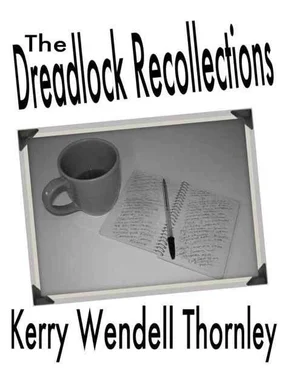Possibly related to an earlier time is a memory of breakfasting with Slim one blazing morning in a tiny restaurant on Lake Pontchartrain, with Brother-in-law inside a houseboat just across the narrow dock from the front window of the cafe.
Again I don't recall how we got there or where we went afterwards.
More than once I have wondered, though, if I was hypnotized aboard that houseboat that day, perhaps by means of drugs, and then methodically programmed. For I have a number of memories which are dreamlike in quality and seem unrelated to anything else that ever happened to me, except that they are vaguely associated with Brother-in-law.
Woody Guthrie singing about the "arch and the stones" in one of his albums reminded me vividly of these disassociated fragments of memory, pertaining to images of myself as the "first post-revolutionary man" of uncharacteristically utopian and romantic Marxist rhetoric, and as a lonely anarchist harmonica player wandering through America.
Also I seem to recall having received instructions regarding a future mission of saving the U.S. from a Russian invasion. I have a sense of being told that I would be able to rely on the radio for help, just by listening to the music. Such things cause me to speculate that Brother-in-law may have been a high-level double agent who sold projects to hypnotically program me to both Russian intelligence and Division Five of the FBI, without anyone but Slim knowing what an outrageous practical joke he was playing on us all.
Swept up in the beauty of an abstraction, I was not paying any attention whatsoever to what was happening with this man in this room in this particular here and now, so I freely granted him permission to brainwash me.
Zen Masters call that the danger of partial enlightenment!
A scene I recall vividly took place as the three of us were returning from a trip somewhere, walking across the gravel in front of Gary's house. I had been discussing the building of a mass movement, a great Objectivist army of tax protesters marching into Washington, singing songs and shouting slogans in the manner of a Civil Rights demonstration.
"No," said Brother-in-law as we approached his door, "that isn't what you want. To overthrow the government takes an organization that is neither fish nor fowl, something that cannot be readily categorized, with some of the aspects of a bureaucracy and others of organized crime. That way, it will be nearly invisible to the average person."
Lacking the necessary color and flamboyance to interest me, and sounding rather sinister besides, that idea turned me off. I tucked it away in the back of my mind as a warning.
Once we talked at length about the time a few years earlier when the U.S. intervened secretly in Guatemala to overthrow a leftist regime. Brother-in-law asked me if I didn't think that was a good policy, and of course in those days I did. I went on to recite a few facts about the incident I'd read in a national magazine, something which seemed to gratify him, and thereupon he spoke knowledgeably about the operation in the manner of someone who had troubled himself to become quite well informed about it, but I don't recall his mentioning the CIA in that respect.
We also spoke of the capture of the Soviet spy, Rudolph Abel, and of what a brilliant victory for U.S. espionage that had been. I do not remember, however, whether or not we ever discussed the trade of Abel for our U-2 pilot, Francis Gary Powers, made by the Kennedy Administration. However, since the U-2 planes took off and landed at Atsugi when I was overseas in the Marines, in an aura of official mystery until the U-2 incident involving Powers, the subject of the U-2 was of personal interest to me.
In Undercover , E. Howard Hunt mentions that many of the uniformed officers working with him at one time had been in private life attorneys. "Among those I came to know," he writes, "were Navy Lieutenant James Donovan, who was later to defend GRU Colonel Rudolf Abel, the Soviet spy, and who was instrumental in exchanging him for U-2 pilot Gary Powers." Hunt also discusses the U-2 project in his book, mentioning those involved in its development, etc.
Brother-in-law liked to grin and chew on his pipe and allow a considerable silence to pass before changing the subject from one of his little reminders to the next one.
"You know, Kerry, there is a member of the Rockefeller family who travels around the country making Satanist human sacrifices. And he has a whole set-up, like a traveling road show, he takes with him for that purpose. His name is Tracy Barnes. Can you remember that, Kerry? Tracy Barnes."
In the quiet that followed I wondered if such a fantastic story could be true. Certainly the rich could not be murdering the common people in the most outrageous of all possible manners and be getting away with it simply because they were the rich, and not the poor! That seemed highly unlikely, to say the least.
But then, if by some quirk in our system of government or economics it were true, there was nothing I could be expected to do about it, anyhow. So why this urgent insisting to remember?
As an Ayn Rand Objectivist I thought it my rational duty to assume innocence without hard evidence of guilt, particularly when rich capitalists were the objects of accusation. For as Ayn Rand incessantly pointed out, there were swarms of envious parasites under every rock, just looking for safe ways to snipe at the rich and productive industrialist.
Writes E. Howard Hunt in Undercover , "Then to my welcome surprise I was summoned to the office of C. Tracy Barnes, a wartime associate of Allen Dulles, Wall Street lawyer and brother-in-law of Joe Bryan. Barnes swore me to special secrecy and revealed that the National Security Council under Eisenhower and Vice President Nixon had ordered the overthrow of Guatemala's Communist regime. If I accepted the proposed assignment, Barnes told me, it would be as head of the project's propaganda and political action staff, and he added that naturally no clandestine project had higher priority than this."
Brother-in-law was to tell the same story about Tracy Barnes and the Satanist human sacrifices a number of times. That I should not forget it seemed especially urgent to him.
According to Carl Oglesby in The Yankee and the Cowboy War , "It was in reality such 'hard-nosed liberals' as the CIA's Tracy Barnes and Edward Lansdale (for whom Ellsberg worked in Vietnam) and Kennedy's chief military advisor Maxwell Taylor who advocated clandestine war, or Special Forces warfare, as an alternative to conventional military and diplomatic options and thus got the U.S. involved untenably in Cuba and Vietnam."
"Tracy Barnes is a little man, Kerry," he added with what seemed like genuine anger in his voice. "Don't you agree that little men are subject to Napoleon complexes, that they tend to compensate for their deficiency in height by abusing their power?"
"Yes," I said, going on at some length about all the examples of little men who shouted orders and made unreasonable demands in high school ROTC and the Marine Corps.
"At headquarters I paid protocolary calls on Allen Dulles and General Cabell, Frank Wisner," at this point in Undercover , Hunt inserts a footnote ("A diminutive personal assistant to Frank Wisner was known as the Ozard of Wiz.") continuing with, "and his principal assistant, Tracy Barnes. Freed from the parochialism of OSO, Dick Helms was now chief of operations for the entire Clandestine Services. In each other we discerned kindred spirits and formed a friendship which, though sporadic, due to my extended absences abroad, continued until the summer of 1972, when my name was first mentioned in connection with Watergate."
Since then, in recent years, I have learned that twitting Tracy Barnes about his stature is a favorite CIA pastime, as also is resistance to "parochial," or Jesuit, influences, which tend to dominate the intelligence community, often by indirect means. Hunt's wife, Dorothy, for example, was Catholic, and therefore the statement about his relation to Helms may contain some subtle allusions.
Читать дальше












